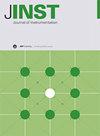A low-power and high-gain frontend for GHz application using trans-impedance amplifier for fast particle detection
IF 1.3
4区 工程技术
Q3 INSTRUMENTS & INSTRUMENTATION
引用次数: 0
Abstract
Abstract In this paper, we present a front-end for gigahertz applications, FGATI, which utilizes a transimpedance amplifier design to amplify the current signal from a diamond particle detector. The transimpedance amplifier design adopts a flipped-voltage-follower-based current-mirror (FVF-CM) topology as the input stage, offering advantages such as low power consumption, large transimpedance gain, gigahertz bandwidth, and reasonable noise levels. The FVF-CM topology was realized to improve noise reduction with a fully differential output configuration. The design was implemented as an ASIC chip using 65 nm CMOS silicon technology. The bandwidth measurement of the FGATI prototype demonstrated a 3-dB bandwidth of 1.2 GHz. Furthermore, the amplifier's power consumption is low, drawing only 7.2 mW/channel from a 1.2 V power supply, including the buffer stage. The measurement of the FGATI output signal indicated an excellent transimpedance gain of 79.2 dBΩ and a noise level of 6.7 mV rms . These findings highlight the feasibility and effectiveness of the proposed front-end design in high-frequency applications.一种低功耗高增益前端,用于GHz应用,使用反阻抗放大器进行快速粒子检测
在本文中,我们提出了一种用于千兆赫应用的前端,FGATI,它利用透阻放大器设计来放大来自金刚石粒子探测器的电流信号。跨阻放大器设计采用基于翻转电压跟随器的电流镜(FVF-CM)拓扑作为输入级,具有低功耗、大跨阻增益、千兆赫带宽和合理的噪声水平等优点。实现了FVF-CM拓扑结构,以提高全差分输出配置的降噪效果。该设计采用65nm CMOS硅技术作为ASIC芯片实现。FGATI原型机的带宽测量显示,3db带宽为1.2 GHz。此外,放大器的功耗很低,从1.2 V电源(包括缓冲级)中仅吸取7.2 mW/通道。FGATI输出信号的测量表明,其跨阻增益为79.2 dBΩ,噪声水平为6.7 mV rms。这些发现突出了所提出的前端设计在高频应用中的可行性和有效性。
本文章由计算机程序翻译,如有差异,请以英文原文为准。
求助全文
约1分钟内获得全文
求助全文
来源期刊

Journal of Instrumentation
工程技术-仪器仪表
CiteScore
2.40
自引率
15.40%
发文量
827
审稿时长
7.5 months
期刊介绍:
Journal of Instrumentation (JINST) covers major areas related to concepts and instrumentation in detector physics, accelerator science and associated experimental methods and techniques, theory, modelling and simulations. The main subject areas include.
-Accelerators: concepts, modelling, simulations and sources-
Instrumentation and hardware for accelerators: particles, synchrotron radiation, neutrons-
Detector physics: concepts, processes, methods, modelling and simulations-
Detectors, apparatus and methods for particle, astroparticle, nuclear, atomic, and molecular physics-
Instrumentation and methods for plasma research-
Methods and apparatus for astronomy and astrophysics-
Detectors, methods and apparatus for biomedical applications, life sciences and material research-
Instrumentation and techniques for medical imaging, diagnostics and therapy-
Instrumentation and techniques for dosimetry, monitoring and radiation damage-
Detectors, instrumentation and methods for non-destructive tests (NDT)-
Detector readout concepts, electronics and data acquisition methods-
Algorithms, software and data reduction methods-
Materials and associated technologies, etc.-
Engineering and technical issues.
JINST also includes a section dedicated to technical reports and instrumentation theses.
 求助内容:
求助内容: 应助结果提醒方式:
应助结果提醒方式:


